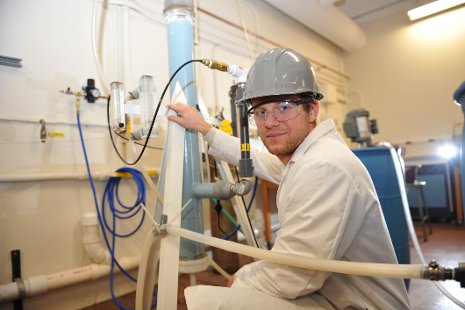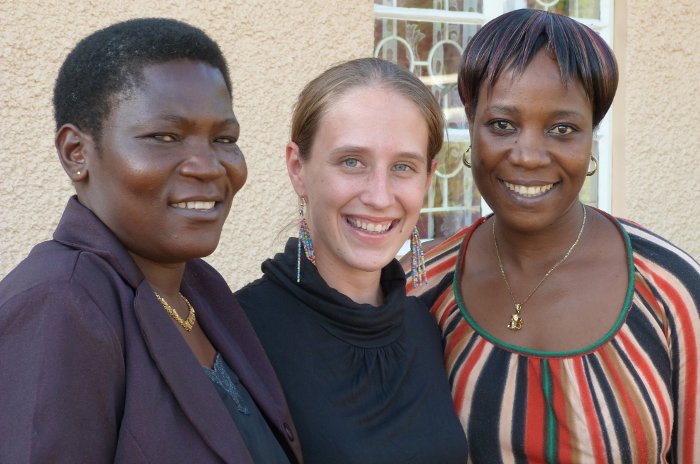
The contest was part of the SME (Society for Mining, Metallurgy and Exploration) Annual Meeting. Thirteen graduate students from all over the world entered posters in the event.
The Tech students’ advisor, Chair Komar Kawatra (ChE), is on sabbatical as a Fulbright scholar in India and flew to Seattle for the competition.
“I am very fortunate to be working with graduate students like Howard and Brett,” said Kawatra. “They are highly motivated and just outstanding. One day I expect them to be CEOs of major corporations.”
Spigarelli earned the top spot for his poster on optimizing a carbon-dioxide scrubber that removes 50 percent of the CO2 passing through.
The scrubber, an 11-foot bench-model plastic pipe packed with glass beads, has a water-based solution flowing through it. From below, carbon dioxide bubbles up, reacting with chemicals in the liquid. The process not only captures carbon, it binds it in a solid form, making an undisclosed product that can be used as a construction material. The liquid itself can be recovered and used again.
The group has received a patent and hopes to build a pilot plant in cooperation with industry partner Carbontec Energy Corp.
Spigarelli’s prize-winning poster focused on making the scrubber as efficient as possible. In particular, he developed a model for determining the ideal concentration of chemical in solution to strip out CO2. “You want to remove as much carbon as possible, but you don’t want to use excess chemicals, because you want to save the company money,” Spigarelli said. “This process will give you the best results.”
Haselhuhn’s third-place poster also focused on water chemistry. At an iron-processing facility, he studied the technology used to remove impurities from iron ore. He found ways to improve the process and significantly boost productivity.
“The iron ore is ground down into very small particles, which are mixed in water,” he said. “The larger particles, which contain more iron ore, settle quickly, and the smallest ones, containing silica, stay suspended.” However, Haselhuhn discovered, sometimes the raw ore contains high levels of magnesium, which translates into higher concentrations of magnesium in the water. In turn, that causes silica particles to cluster together and settle out with the iron, rendering the separation process ineffective.
“By compensating for the excess magnesium, companies could reduce the loss of iron in their concentration process,” Haselhuhn said. “The results of this research will save millions of dollars per year and reduce the loss of an important natural resource.”
by Marcia Goodrich, magazine editor
Published in Tech Today
